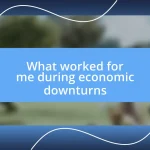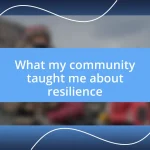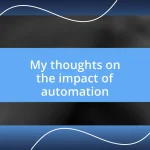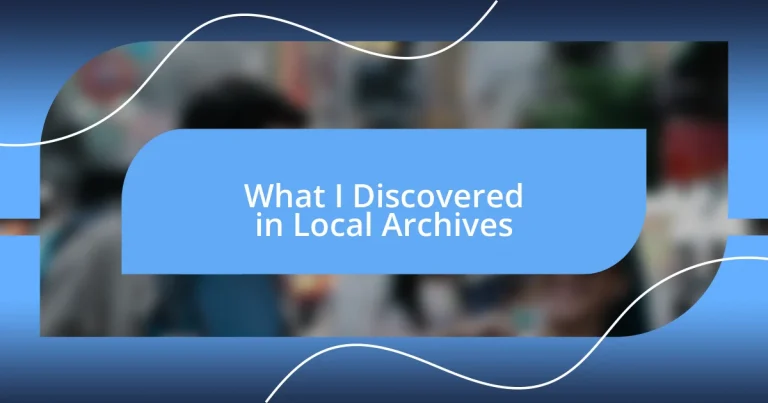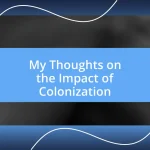Key takeaways:
- Local archives serve as vital resources that connect individuals to their heritage, offering insights into personal and community narratives.
- Engagement with local archives provides educational opportunities, revealing historical documents that enrich understanding of the past and community identities.
- Preserving findings from archives through organization and sharing encourages deeper reflection and fosters community dialogue around local history.
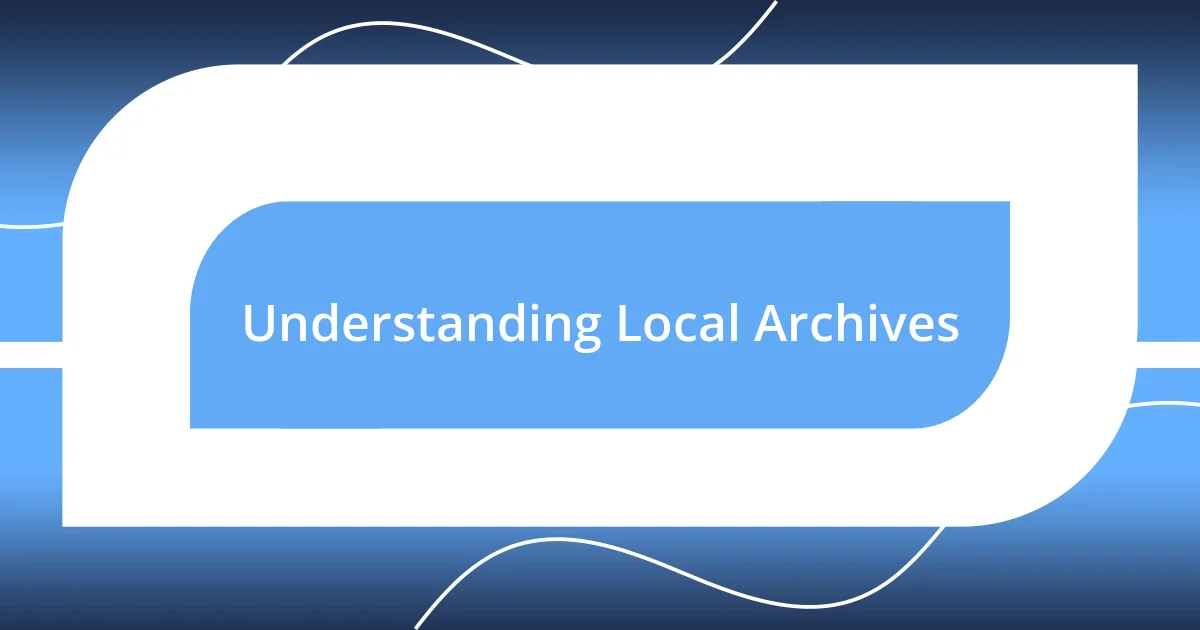
Understanding Local Archives
Local archives are treasure troves of history waiting to be unearthed. I remember the first time I stepped into my local archive; the musty smell of old paper and the sight of dusty boxes filled with forgotten stories instantly drew me in. It’s fascinating to think about all the lives that have come and gone, leaving behind snippets of their existence just waiting for someone curious enough to delve into them.
These archives often contain an array of materials, from government records to personal letters, each telling a unique story. I once stumbled upon a collection of love letters from the 1940s, filled with hopes and dreams during a time of uncertainty. It made me wonder, what would happen if more people took the time to explore such heartfelt remnants of the past? The emotional weight behind those words connected me to a reality far removed from my own.
Understanding local archives also means recognizing their role in preserving community history. I often ask myself, how much do we really know about the local narratives that shape our identities? Engaging with these records gives us a deeper appreciation of our surroundings and the people who came before us, offering insights that enrich our present. Each visit to an archive feels less like a research task and more like a personal journey through time that I can’t recommend enough.
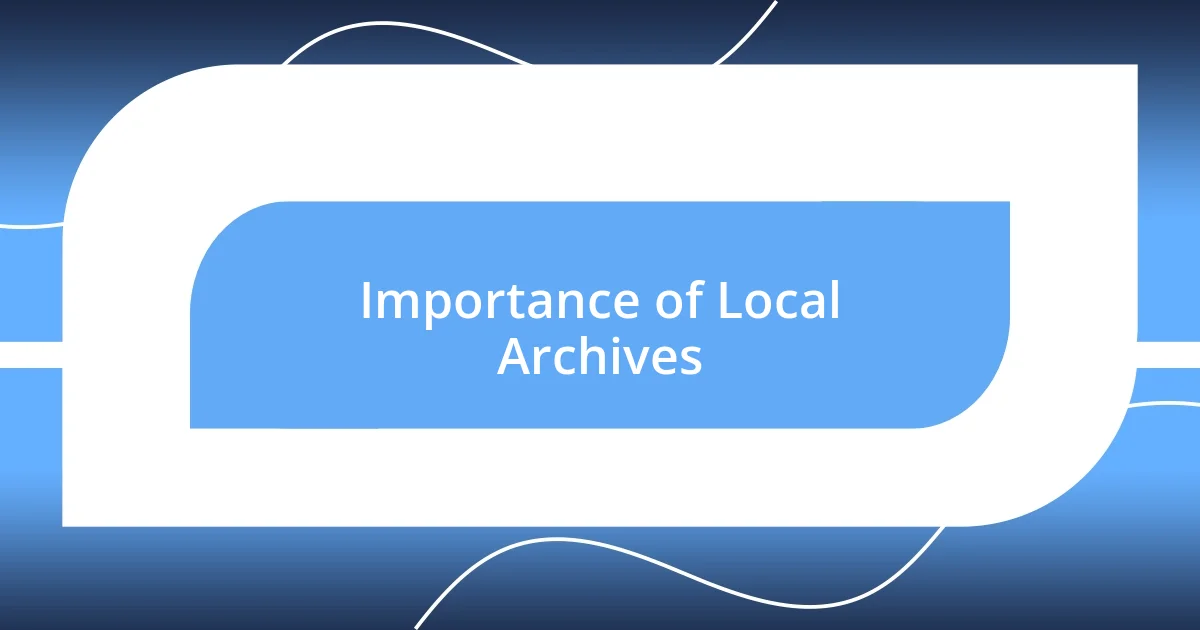
Importance of Local Archives
Local archives are crucial for connecting individuals to their heritage. The discovery of a family tree in my local archive opened a door to my past that I never knew existed. I felt a rush of excitement as I traced my ancestors’ roots, highlighting that these archives hold the keys to our personal histories and the larger community narrative.
Another interesting aspect is that local archives serve as a resource for researchers and historians alike. While sifting through records, I found valuable information that contributed to a community project I was involved in. This experience underscored the archives’ role in not just preserving history, but actively engaging with it to foster understanding and collaboration within the community.
Lastly, local archives offer a platform for educational opportunities. I once participated in a workshop that allowed us to explore historical documents firsthand, bridging the gap between the past and present. This experience was illuminating, making me realize how little we often know about our own surroundings. Engaging with archives creates a pathway for learning and growth, helping us all appreciate the intricate tapestry of our local narratives.
| Aspect | Importance |
|---|---|
| Personal Connection | Helps individuals trace their ancestry and personal history |
| Resource for Research | Supports historians and community projects with invaluable materials |
| Educational Opportunities | Facilitates learning experiences that connect past to present |
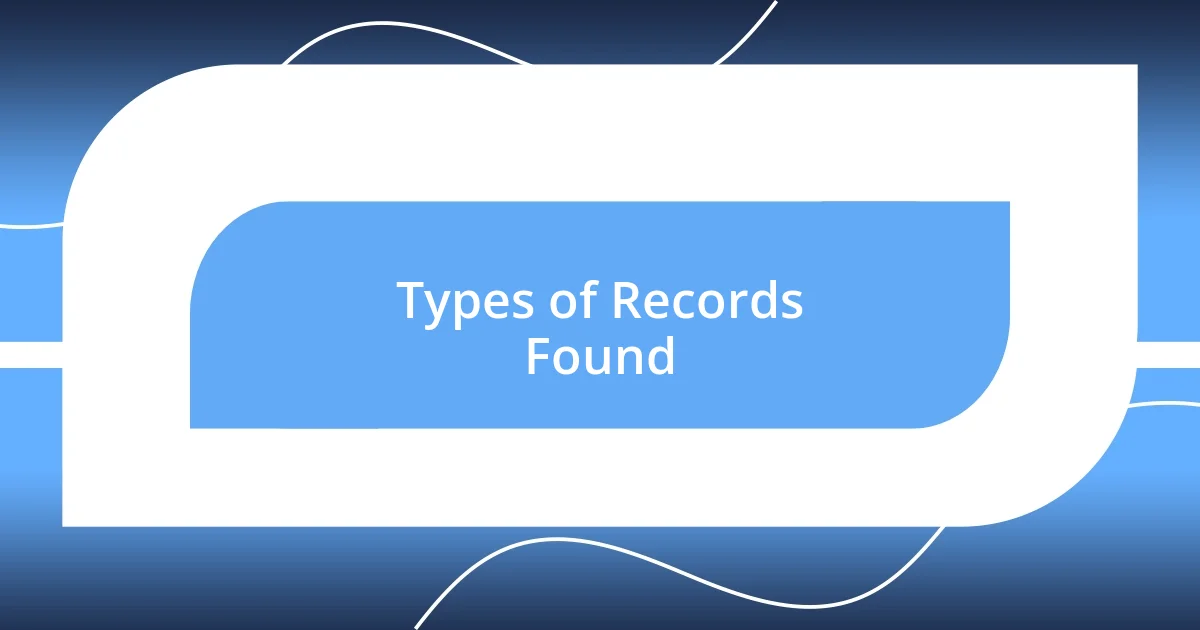
Types of Records Found
When exploring local archives, I often find a captivating range of records that reveal the fabric of our communities. Each discovery brings a sense of wonder, as I uncover documents like census records, property deeds, and even historical maps. I remember the time I stumbled upon a birth record that not only provided specific dates but also sparked a curiosity about the family dynamics of that era. It’s these little pieces of information that weave together the larger narrative of a place.
Here’s a quick rundown of the types of records you might come across in local archives:
- Census Records: Lists of individuals, offering insights into population demographics over time.
- Property Deeds: Documents detailing land ownership, which can reveal economic and social trends.
- City Directories: Compilations of residents and businesses, showcasing the evolution of the local economy.
- Personal Letters and Diaries: Firsthand accounts that capture emotions and daily life, adding a personal touch to history.
- Photographs and Postcards: Visual snapshots of a bygone era, allowing us to witness changes in our surroundings.
Each record I encounter feels like a puzzle piece, fitting into the larger picture of history, and it always leaves me eager for the next visit. The emotional connection to these documents can be profound, reminding me that each name and date is tied to a lived experience.
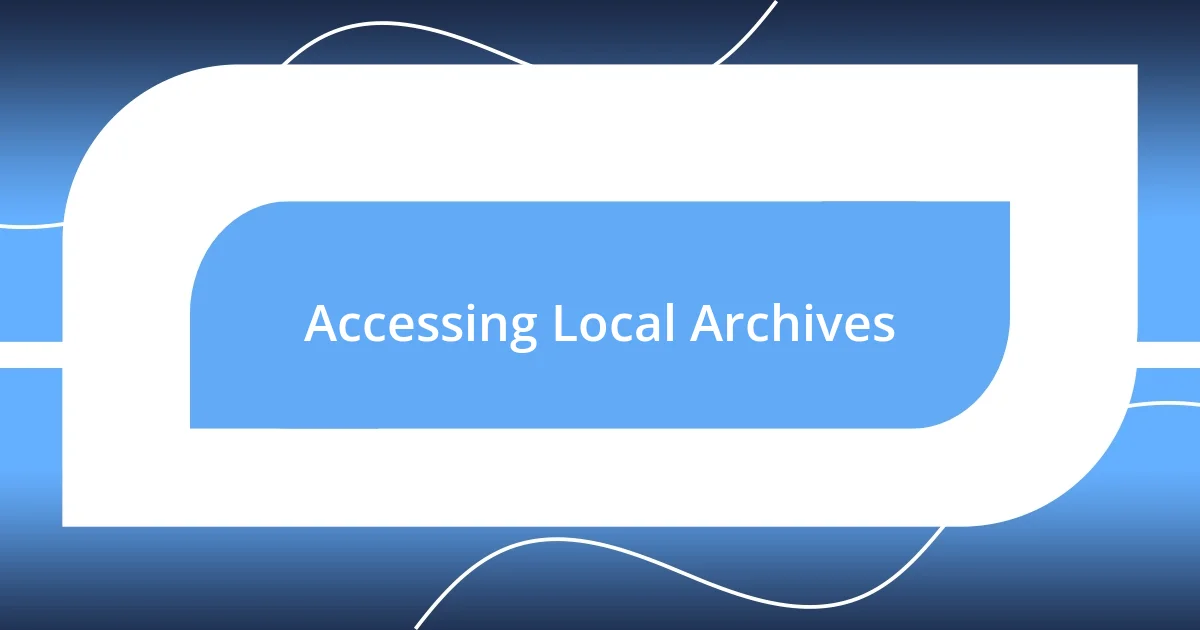
Accessing Local Archives
Accessing local archives can be one of the most rewarding yet initially intimidating experiences. I remember stepping into my first archive, feeling a mix of excitement and uncertainty. It’s not just about finding information; it’s about connecting to a place that holds countless stories — many of which are waiting for you to discover them.
Once inside, I was pleasantly surprised by how accessible the records were, despite my fears of navigating through dusty old books and overwhelming files. The staff was incredibly welcoming and knowledgeable, which made all the difference. They guided me through the process, showing me how to locate specific documents and sharing tips on what to look for. Did you know that a simple conversation with a staff member could lead you to unexpected treasures? It’s true! I once learned about a collection of local newspapers that detailed the unfolding drama of a bygone era, deepening my understanding of the community’s evolution.
It’s essential to plan ahead before your visit. I found that making a list of what I wanted to search for helped keep me focused during my explorations. I often set aside time to review what I wanted to investigate, which can easily lead to delightful surprises. I distinctly remember finding a document that revealed a long-lost connection between my family and a local landmark. That moment was a reminder that often, the history we seek is right beneath our noses, waiting to be uncovered. So, what’s holding you back? I encourage you to dive into your local archives — you may just discover more than you ever imagined.
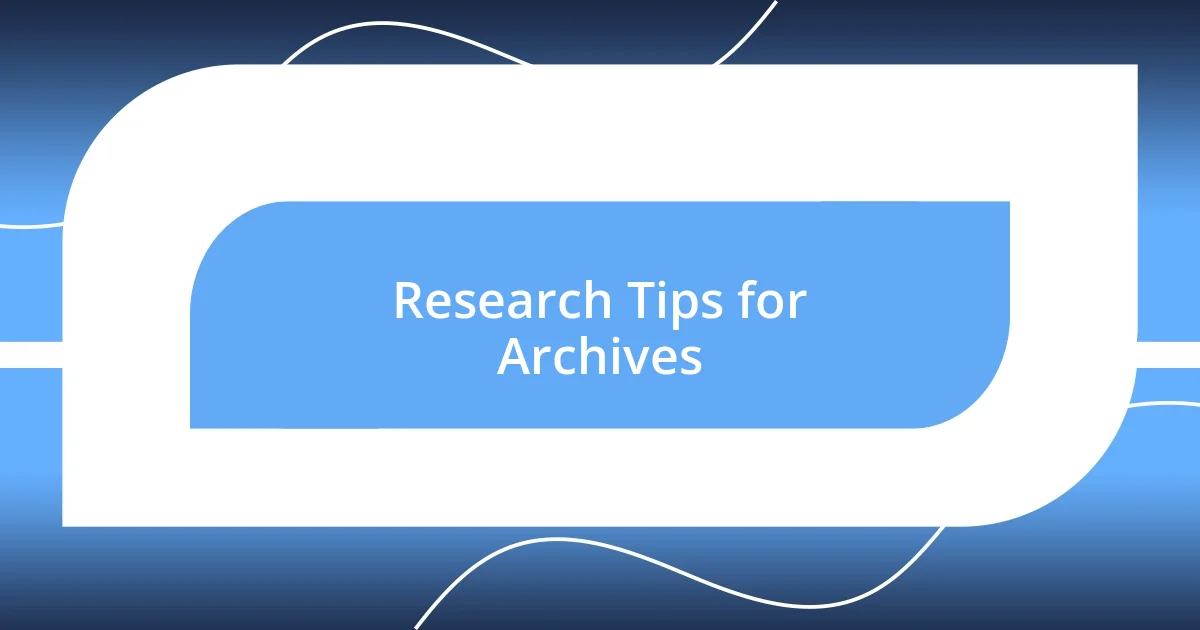
Research Tips for Archives
When you approach an archive, organization is key. I’ve often spent precious minutes fumbling through piles of documents, wishing I had a clearer strategy. Now, whenever I plan a visit, I make sure to bring a notebook with specific questions or themes in mind. This keeps my research focused and often leads me to connections I might otherwise overlook. Have you ever lost track of what you were looking for? Trust me; it can be easy to get sidetracked, especially when there are so many fascinating stories calling out for your attention.
Embrace the digital tools that archives may offer. The first time I accessed an online catalog before visiting, I felt like I had a map before a treasure hunt. Being able to search for particular keywords or types of records helped me hone in on what mattered most to me. I remember discovering a digital image of a newspaper advertisement that featured my great-grandfather’s business. That simple find turned into hours of research about his life and contributions to the community. Isn’t it incredible how one small lead can spark an entire journey?
Lastly, don’t hesitate to interact with other researchers. When I was sifting through a collection of letters in the reading room, a fellow researcher shared his insights about their historical context. His enthusiasm was contagious, and it opened up new avenues of thought for me. I realized that sometimes, the most unexpected connections come from brief conversations with others who share your passion. So why not take a moment to chat with someone next time? You might just unearth a whole new layer of history together.
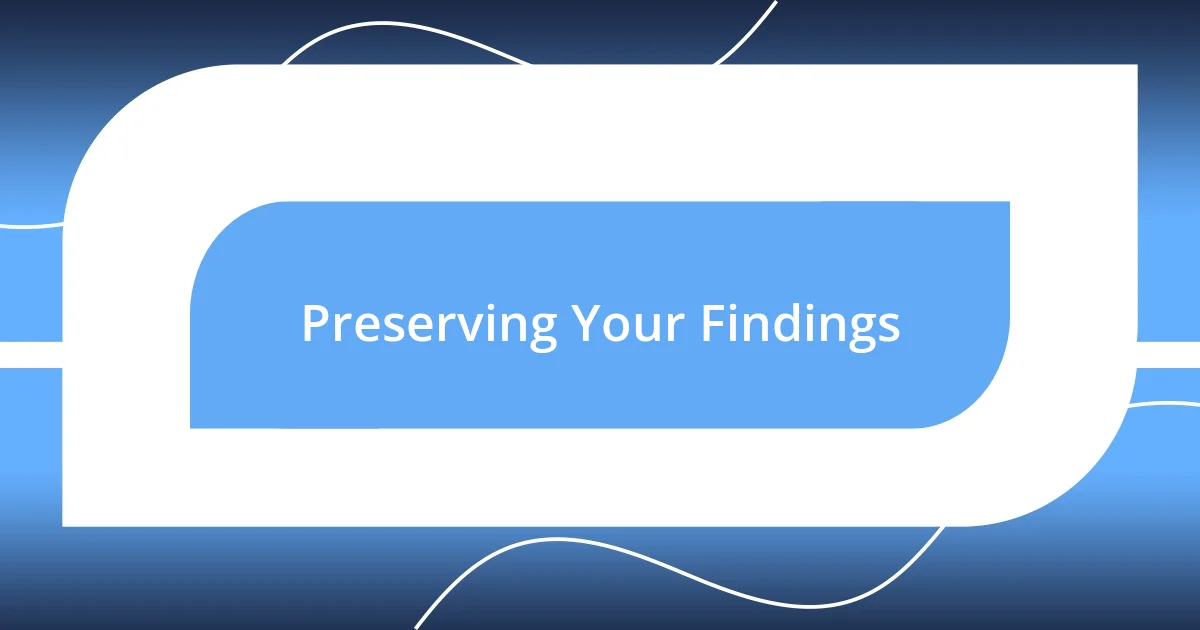
Preserving Your Findings
Once you’ve unearthed those gems from the archives, preserving your findings becomes crucial. I remember painstakingly organizing my notes right after my visits. I found that transcribing everything into a digital format not only kept my discoveries secure but also allowed me to reflect on them more deeply. Have you ever experienced the frustration of losing notes or misplacing documents? Trust me, it’s worth taking the extra time to ensure every piece of information is easily accessible down the line.
Creating a dedicated folder, both physically and digitally, can make a world of difference. I often label folders with dates and themes; this way, I can revisit specific topics effortlessly. One time, I stumbled upon a box of old photographs that had me puzzled for weeks. By creating a systematic way to categorize them, I was able to connect various moments in time, crafting a narrative that gave my research richness and depth. Isn’t it amazing how a little organization can transform a chaotic pile into a beautifully woven story?
Engaging with your findings is just as important as preserving them. After I compile my research, I like to share it with friends or in local history groups. This not only solidifies my understanding but opens the door for feedback and new perspectives. I recall one evening, sitting with a cup of tea and sharing my discoveries with a friend; her excitement about my findings spurred a whole new train of thought. Why not take a moment to share your own treasure trove? You might find your findings resonate with others in ways you never expected!
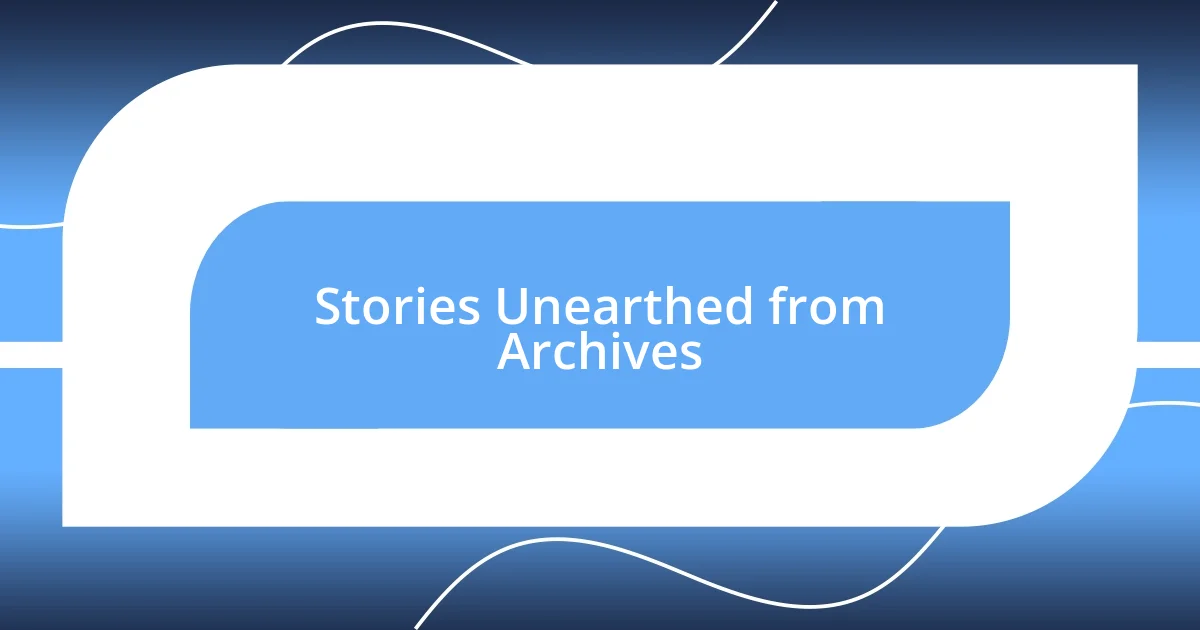
Stories Unearthed from Archives
Unearthing stories from local archives often feels like connecting with long-lost friends. I was once mesmerized by a forgotten diary that belonged to a woman who lived through the Great Depression. Each entry, filled with her hopes and struggles, felt like a window into her soul. Has there ever been a moment when you read something that resonated so deeply it made your heart ache? I found myself empathizing with her circumstances, as if we were sharing a moment across time.
One particularly gratifying experience was discovering a community newsletter from the 1950s while browsing through a dusty box. That newsletter contained not just mundane announcements, but narratives about local events and families that shaped my neighborhood’s history. I had that exhilarating “aha!” moment when I found the name of a distant relative mentioned. It made me wonder how interconnected our lives really are — don’t you sometimes feel that historical threads weave through our family stories in unexpected ways?
On another occasion, I stumbled upon a collection of letters exchanged between two cousins during World War II. Reading their correspondence revealed their fears and hopes against the backdrop of global turmoil. I couldn’t help but imagine the courage they showed, writing to each other despite the uncertainties swirling around them. Have you ever been struck by how relatable the emotions of the past can feel? It was a powerful reminder that history is not just dates and events; it’s about people, their relationships, and the stories they carry with them.



